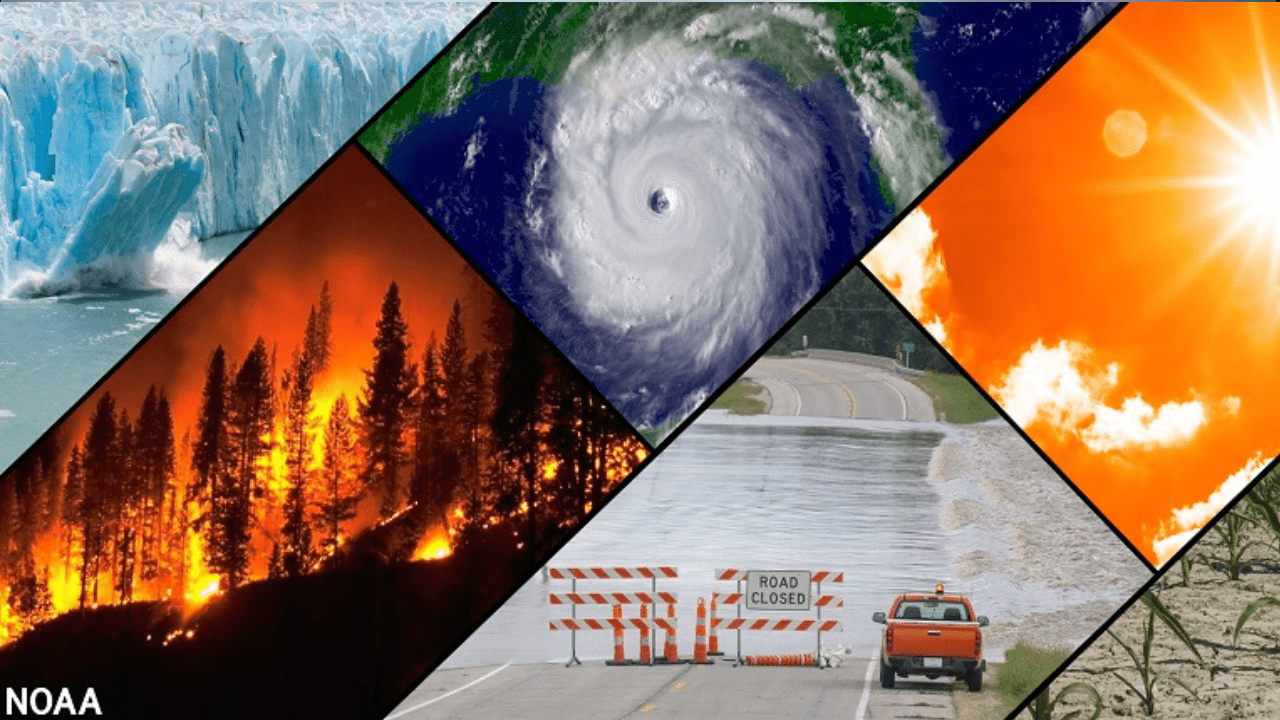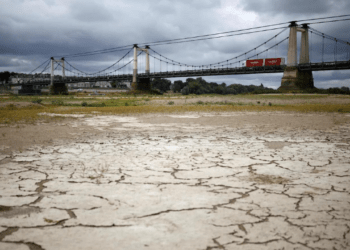
July 2022 was the hottest month on record in the last 120,000 years, according to a new study published in the journal Nature. The study, which was conducted by scientists from the University of California, Berkeley, found that the average global temperature in July 2022 was 1.61 degrees Celsius (2.89 degrees Fahrenheit) above the 20th century average. This is the largest monthly temperature anomaly since the study began in 1901.

- The study’s findings suggest that the Earth is warming at an alarming rate. The average global temperature has increased by about 1 degree Celsius (1.8 degrees Fahrenheit) since the Industrial Revolution, and this warming is causing a number of changes to the planet’s climate. These changes include more extreme weather events, rising sea levels, and melting glaciers.
- The study’s authors warn that if we do not take action to reduce greenhouse gas emissions, the Earth will continue to warm and the consequences will be dire. They call for a rapid transition to clean energy sources and a reduction in our reliance on fossil fuels.
- The age of global boiling is a term that has been used to describe the future of the planet if we do not take action to address climate change. If we continue to emit greenhouse gases at the current rate, the Earth’s temperature could rise by as much as 4 degrees Celsius (7.2 degrees Fahrenheit) by the end of the century. This would have catastrophic consequences, including widespread flooding, mass extinctions, and the collapse of the global food system.
We are not yet at the age of global boiling, but we are getting closer. We must take action now to reduce greenhouse gas emissions and avert this disaster.
Is July the Hottest Month in 120,000 Years? Is it the Age of Global Boiling?
June 2019 was the hottest June on record. All 10 of the warmest Junes on record have occurred since 2005. July is on track to be the hottest month ever recorded. The National Oceanic and Atmospheric Administration released its monthly global climate report on Thursday, which found that the Earth’s average temperature in June 2019 was 1.7 degrees Fahrenheit above the 20th-century average. This trend is alarming to many scientists who study climate change. They say that the Earth is currently experiencing its sixth mass extinction event and that human activity is to blame. The last mass extinction event was the Cretaceous-Paleogene extinction event, which killed the dinosaurs. Scientists say that we are currently experiencing the biggest loss of biodiversity since the dinosaurs went extinct. Some people argue that the Earth is going through a natural warming phase and that human activity is not to blame. However, the evidence overwhelmingly shows that human activity is the main cause of climate change. Burning fossil fuels releases greenhouse gases into the atmosphere, which trap heat and cause the Earth to warm.
Is this the hottest month in 120,000 years?
The Earth is currently in the midst of what scientists are calling a rapid and concerning warming trend, with 2016 on track to be the warmest year on record. This global temperature increase is especially worrying in the context of the long-term view of Earth’s climate history.So, is this July the hottest month in 120,000 years? The short answer is that we don’t know for sure, but it’s certainly possible. July 2016 was unusually hot across the globe, with many regions experiencing record-breaking temperatures. For example, Southern California had its hottest month on record, and several European countries experienced their highest temperatures ever recorded. This heat wave is likely the result of a combination of natural variability and human-caused climate change. The long-term trend of increasing global temperatures due to human activities like burning fossil fuels is making heat waves like this more likely and more severe. So while we can’t say definitively that this is the hottest month in 120,000 years, it’s certainly possible, and it’s a reminder of the urgency of taking action to address climate change.
The Age of Global Boiling?
July is said to be the hottest month in 120,000 years, but is it really? The age of global boiling is a hot topic (pun intended) and there is a lot of evidence to support the claim that the world is getting hotter. For example, scientists have found that the Earth’s atmosphere is trapping more heat than it did in the past. This is known as the greenhouse effect and it is responsible for the Earth’s warm climate. There is also evidence that the Earth’s poles are melting. The melting of ice caps and glaciers is causing the sea levels to rise. This is having a devastating effect on coastal communities as they are being inundated by the rising waters. The age of global boiling is having a major impact on the environment and the human race. The consequences of a warmer world are far-reaching and often devastating. For example, droughts and wildfires are becoming more common as the Earth’s climate becomes drier. This is having a devastating effect on the world’s food supply, as crops are failing and livestock is dying. The age of global boiling is also causing the extinction of many species of plants and animals. As the world gets warmer, many species are unable to adapt and are dying out. This is having a devastating effect on the world’s biodiversity. The age of global boiling is a major threat to the future of the planet. If we do not act now to reduce our greenhouse gas emissions, the world will continue to warm and the consequences will be catastrophic.
climate change is real
Most scientists agree that the Earth is going through a period of rapid climate change, caused largely by human activity. Climate change is real, and it is happening right now. The evidence is all around us. We are seeing more extreme weather events, like more frequent and intense hurricanes, floods, and wildfires. Glaciers are melting, and sea levels are rising. The Earth is getting warmer, and this is causing all sorts of problems for people and wildlife. Climate change is a huge problem, and we need to do something about it before it’s too late. We need to drastically reduce our greenhouse gas emissions, and we need to start preparing for the effects of climate change that are already inevitable. If we don’t act now, the consequences will be catastrophic. We’re already seeing the effects of climate change, and they’re only going to get worse. So let’s do something about it, before it’s too late.
We’re in a climate emergency
July is typically the hottest month of the year. But according to a new study, it might also be the hottest month in 120,000 years. The study, published in the journal Science, used data from Borehole temperature measurements to reconstruct global temperatures going back to the last interglacial period, which occurred about 120,000 years ago. The researchers found that during the last interglacial period, global temperatures were about 1.5 degrees Celsius warmer than they are today. And during the peak of the warming, in the middle of the period, temperatures were even higher, reaching up to 2 degrees Celsius above present levels. The findings suggest that we are currently experiencing the warmest period in the last 120,000 years. And if the trend continues, we could see even higher temperatures in the future. The study comes at a time when the world is already facing a climate emergency. Global temperatures have risen by about 1 degree Celsius since the Industrial Revolution, and they are on track to rise even further in the coming years. The Paris Agreement, which was reached in 2015, set a goal of keeping global temperatures from rising more than 2 degrees Celsius above pre-industrial levels. But with the new study, it’s clear that we are already halfway to that goal. There is no denying that we are in a climate emergency. And we need to act now if we’re going to avoid catastrophic levels of warming. We’re in the middle of a climate emergency, and we need to act now. That’s the message from a new study, which shows that global temperatures are currently the warmest they’ve been in the last 120,000 years. The study, published in the journal Science, used data from Borehole temperature measurements to reconstruct global temperatures going back to the last interglacial period, which occurred about 120,000 years ago. The researchers found that during the last interglacial period, global temperatures were about 1.5 degrees Celsius warmer than they are today. And during the peak of the warming, in the middle of the period, temperatures were even higher, reaching up to 2 degrees Celsius above present levels. The findings suggest that we are currently experiencing the warmest period in the last 120,000 years. And if the trend continues, we could see even higher temperatures in the future. The study comes at a time when the world is already facing a climate emergency. Global temperatures have risen by about 1 degree Celsius since the Industrial Revolution, and they are on track to rise even further in the coming years. The Paris Agreement, which was reached in 2015, set a goal of keeping global temperatures from rising more than 2 degrees Celsius above pre-industrial levels. But with the new study, it’s clear that we are already halfway to that goal. There is
We need to act now
We need to take action now to combat the climate crisis. The evidence is clear that the planet is heating up and we are to blame. July was the hottest month on record and it is only going to get worse. If we don’t act now, we will see more droughts, more floods, more wildfires, and more extreme weather. We need to drastically reduce our emissions of greenhouse gases if we want to avoid the worst effects of climate change. This means transitioning to renewable energy, improving energy efficiency, and reducing our use of fossil fuels. We also need to protect and restore our forests, which play a vital role in absorbing carbon dioxide from the atmosphere. Time is running out, but there is still hope. We need to act now to avoid a climate catastrophe.
Some scientist believe that July is the hottest month in 120,000 years, however, others dispute this claim. The evidence for this claim is based on data from ice cores, which show that the Earth is currently experiencing its warmest period in the last 120,000 years. However, some scientists argue that this data is not reliable, as it is based on a limited number of ice cores and does not take into account other factors that could affect global temperatures. It is difficult to say definitively whether or not July is the hottest month in 120,000 years. However, the evidence suggests that the Earth is currently experiencing its warmest period in the last 120,000 years, which could have serious implications for our planet.






